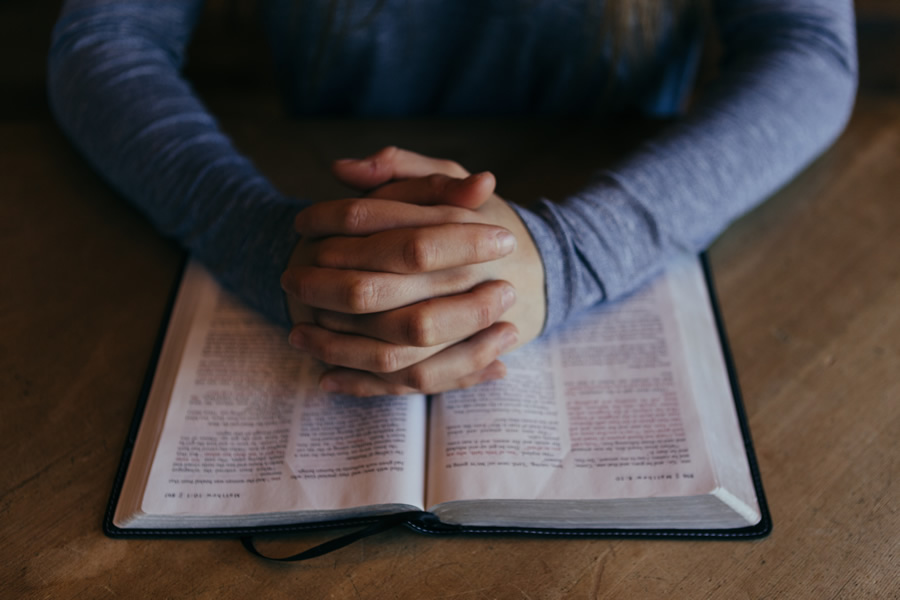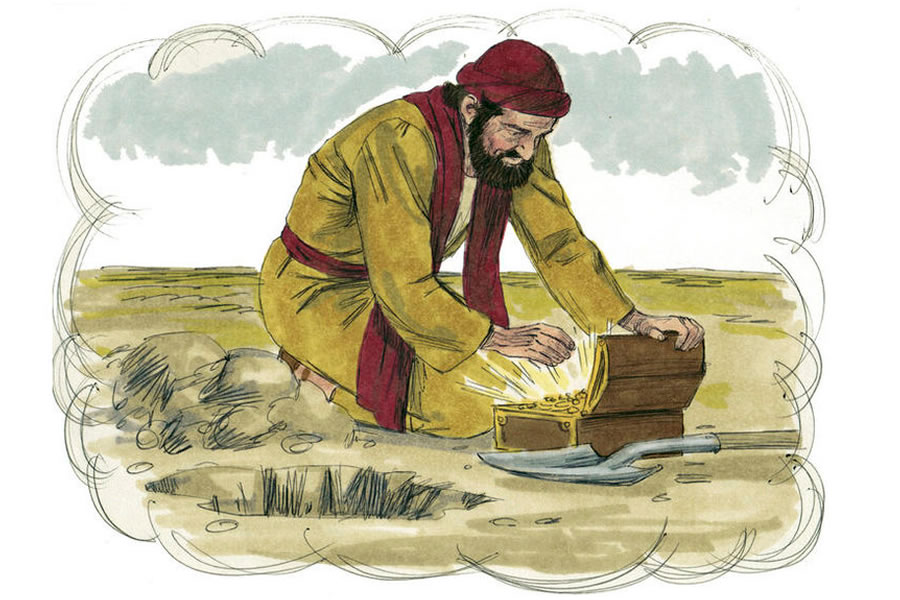St. Francis of Assisi Weekly Reflections

Increase Our Faith
10-05-2025Weekly ReflectionWe Celebrate Worship Resource, Vol. 49, No. 1Destruction. Violence. Strife. Clamorous discord. The words of Habakkuk from around 600 BCE sound as though they could have been written in our era. What can be done? The Lord answered Habakkuk, assuring him that "the just one, because of (their) faith, shall live" (2:4). Our faith in God is key, allowing us, like the Israelites of the first reading, to see past the calamities around us.
Faith, even the size of a tiny mustard seed, can allow us to do great things. If faith can uproot a mulberry, a tree with an extensive root system, it can also uproot prejudice, racism, sexism, greed, hate, and all the societal evils with such twisted roots that they affect our individual attitudes and actions each day even though we cannot see them.
Faith, therefore, enables us to have hope-to be pilgrims of hope-to reveal victories over evils, meaning in suffering, salvation from sin. We do this when we embrace the mission Jesus left his disciples, preaching the gospel in word and deed, serving those in need, and bearing our share of hardships, as Saint Paul encourage Timothy to continue to do. As Jesus tell his disciples in the Gospel, this is what we are obliged to do.
As a pilgrim of hope, how do you offer hope to those discouraged or victimized by the evils and miseries of our era?
-We Celebrate Worship Resource, Vol. 50, No. 68mahi
Aumenta Nuestra Fe
Destrucción. Violencia. Conflictos. Discordia clamorosa. Las palabras de Habacuc, de alrededor del año 600 a. C., parecen escritas en nuestra época. ¿Qué podemos hacer? El Señor le respondió a Habacuc, asegurándole que «el justo, por su fe, vivirá» (2:4). Nuestra fe en Dios es clave, pues nos permite, como a los israelitas de la primera lectura, ver más allá de las calamidades que nos rodean.
La fe, incluso del tamano de una diminuta semilla de mostaza, nos permite hacer grandes cosas. Si la fe puede arrancar una morera, un árbol con un extenso sistema de raíces, también puede arrancar el prejuicio, el racismo, el sexismo, la codicia, el odio y todos los males sociales con raíces tan retorcidas que afectan nuestras actitudes y acciones individuales cada día, aunque no las veamos.
La fe, por lo tanto, nos permite tener esperanza -ser peregrinos de esperanza-, revelar victorias sobre los males, es decir, en el sufrimiento, la salvación del pecado. Lo hacemos cuando abrazamos la misión que Jesús dejó a sus discípulos: predicar el evangelio con palabras y obras, servir a los necesitados y compartir nuestras dificultades, como San Pablo anima a Timoteo a seguir haciendo. Como Jesús les dice a sus discípulos en el Evangelio, esto es lo que estamos obligados a hacer.
Como peregrino de la esperanza, ¿cómo ofreces esperanza a aquellos desanimados o víctimas de los males y miserias de nuestra era?
-We Celebrate Worship Resource, Vol. 50, No. 68

No Servant Can Serve Two Masters
09-21-2025Weekly ReflectionWe Celebrate Worship Resource, Vol. 49, No. 1The dishonest steward in Jesus' parable is no hero. He does not use the talents he is given to earn more or to forgive the debts of a person in dire straits. No, he discounts the debts of his master's debtors because soon he will be out of a job and looking for help from them.
He is a wily and self-centered manipulator who cannot be trusted with his master's wealth, cannot be trusted with his own wealth, and cannot be trusted with what Jesus calls true wealth. True wealth, as Jesus hints in the final verse, is found in the kingdom of heaven. It is not money, or assets, or the accumulation of material possessions.
In fact, it is neither material nor a possession. True wealth is spiritual; it is a share in what is God's. Jesus himself gives us a model to follow when he places all his "wealth" in the service of others, whether feeding the thousands, healing the sick, or suffering for us all. This is how we serve God, not mammon.
How can you be a prudent steward of your material possessions, aware that true wealth is found in God?
-We Celebrate Worship Resource, Vol. 50, No. 3
No Hay Criado Que Pueda Servidor a Dos Amos
El mayordomo deshonesto de la parábola de Jesús no es un heroe. No usa los talentos que recibe para ganar mas ni para perdonar las deudas de alguien en apuros. Al contrario, descuenta las deudas de los deudores de su amo porque pronto se quedará sin trabajo y les pedirá ayuda.
Es un manipulador astuto y egocentrico a quien no se le puede confiar la riqueza de su amo, ni la suya propia, ni lo que Jesús llama verdadera riqueza. La verdadera riqueza, como Jesús insinua en el versículo final, se encuentra en el reino de los cielos. No es dinero, ni bienes, ni la acumulación de posesiones materiales.
De hecho, no es material ni una posesión. La verdadera riqueza es espiritual; es una parte de lo que es de Dios. Jesus mismo nos da un modelo a seguir cuando pone toda su riqueza al servicio de los demas, ya sea alimentando a miles, sanando a los enfermos o sufriendo por todos nosotros. Así es como servimos a Dios, no a Mammón.
¿Como podemos ser administradores prudentes de nuestras posesiones materiales, conscientes de que la verdadera riqueza se encuentra en Dios?
-We Celebrate Worship Resource, Vol. 50, No. 3

Are You Embracing Your Cross?
09-14-2025Weekly ReflectionWe Celebrate Worship Resource, Vol. 49, No. 1Since the seventh century CE, Christians have celebrated a feast on this date to commemorate the cross that Jesus made holy by his exaltation. Before his crucifixion, a cross would have been the most unlikely of religious symbols. But Jesus transformed the cross from an object of torture and humiliation to one of triumph and salvation.
In this feast's first reading, God directs Moses to mount a bronze serpent on a pole and lift it up so that all those who had been punished with lethal snakebites could look up to it and live. Jesus recalls this event when he tells Nicodemus that he too would be lifted up and that those who look to him would have eternal life.
Note that the bronze serpent did not prevent venomous snakebites to begin with, but it restored life to those who had been bitten. We still suffer when we carry our crosses, but Jesus brings new life to those who look to him on the cross, willingly embrace their own cross, and place their faith in God's plan of salvation.
When do you look to Jesus' acceptance of his cross as an example of how you should do the same?
-We Celebrate Worship Resource, Vol. 50, No. 3
Y Tu, ¿aceptas tu cruz?
Desde el siglo VII d. C., los cristianos celebran una fiesta en esta fecha para conmemorar la cruz que Jesús santifico con su exaltacion. Antes de su crucifixión, una cruz habría sido el símbolo religioso más improbable. Pero Jesús transformo la cruz de objeto de tortura y humillacion en objeto de triunfo y salvación.
En la primera lectura de esta fiesta, Dios le ordena a Moises que monte una serpiente de bronce sobre un asta y la levante para que todos los castigados con mordeduras letales de serpiente pudieran contemplarla y vivir. Jesús recuerda este acontecimiento cuando le dice a Nicodemo que él tambien sería elevado y que quienes lo contemplaran tendrían vida eterna.
Cabe destacar que la serpiente de bronce no evitó las mordeduras de serpientes venenosas, pero devolvió la vida a quienes las habían sufrido. Aun sufrimos al cargar con nuestras cruces, pero Jesus trae nueva vida a quienes lo contemplan en la cruz, aceptan voluntariamente su propia cruz y confían en el plan de salvacion de Dios.
¿Cuando consideras que la aceptacion de la cruz por parte de Jesús es un ejemplo de cómo deberías hacer lo mismo?
-We Celebrate Worship Resource, Vol. 50, No. 3

Take Up Your Cross and Follow Me
09-07-2025Weekly ReflectionWe Celebrate Worship Resource, Vol. 49, No. 1A single word in today's Gospel make its lesson difficult to accept. Jesus tells the crowds that no one can be his disciple without first hating all their own family members. How could Jesus, who had just taught them to love their own neighbor, say such a thing? Bible scholars suspect that Jesus may be employing Semitic exaggeration here, choosing an overly strong word instead of renouncing or refusing.
Jesus' lesson is that discipleship demands total commitment: a willingness to carry one's cross, to renounce one's possessions, to put Jesus first. After all, the first disciple left their families to follow Jesus, sharing in his ministry and becoming his family. In the second reading, Saint Paul, having converted Philemon and then his runaway slave Onesimus, urges Philemon to accept Onesimus, not as a slave, but as a brother in Christ, serving the gospel rather than himself.
As his disciples now, we too are called to put Christ first, even as we serve our neighbor, our spouse, our parent. Loving our family is great, but building up the kingdom of God is greater. Participating in this mission as Jesus' disciple is our most important calling.
When should you renounce or sacrifice in order to share in Christ's mission more fully?
-We Celebrate Worship Resource, Vol. 50, No. 3
Toma Tu Cruz Y Sígueme
Una sola palabra en el Evangelio de hoy dificulta la comprensión de su lección. Jesus les dice a las multitudes que nadie puede ser su discípulo sin odiar primero a todos sus familiares. ¿Cómo pudo Jesús, quien acababa de enseñarles a amar al projimo, decir algo así? Los estudiosos de la Biblia sospechan que Jesús podría estar empleando una exageración semítica, eligiendo una palabra demasiado fuerte en lugar de renunciar o negarse.
La lección de Jesús es que el discipulado exige un compromiso total: la disposicion a cargar la cruz, a renunciar a las posesiones, a poner a Jesús en primer lugar. Después de todo, el primer discípulo dejó a sus familias para seguir a Jesús, compartiendo su ministerio y convirtiendose en su familia. En la segunda lectura, san Pablo, tras haber convertido a Filemón y luego a su esclavo fugitivo Onésimo, insta a Filemón a aceptar a Onesimo no como esclavo, sino como hermano en Cristo, sirviendo al evangelio antes que a sí mismo.
Como discípulos suyos ahora, tambien estamos llamados a poner a Cristo en primer lugar, incluso al servir a nuestro prójimo, a nuestro cónyuge, a nuestros padres. Amar a nuestra familia es grandioso, pero edificar el reino de Dios es aun mayor. Participar en esta misión como discípulos de Jesús es nuestro llamado más importante.
¿Cuando debemos renunciar o sacrificarnos para participar más plenamente en la misión de Cristo?
-We Celebrate Worship Resource, Vol. 50, No. 3

Invited to the Feast
08-31-2025Weekly ReflectionWe Celebrate Worship Resource, Vol. 49, No. 1Jesus loves to tell parables about banquets and feasts, doesn't he? In the one we hear today, a guest takes a prominent seat at the table, only to be directed, embarrassingly, to the lowest place instead. Jesus praises the guest who sits humbly and then is invited to a higher position.
He has a lesson to the host as well: Do not invite those who will repay you by inviting you to their own feasts, but the poor and forgotten, who have no way to repay you. "You will be repaid," Jesus concludes, in a much better way: "at the resurrection of the righteous" (Luke 14:14).
Jesus invites us all to the heavenly banquet, an offer we have no ability to return in kind. Or do we? Recall that Jesus teaches that what we do for the least of our brothers and sisters we do for him. Therefore, we repay him by feeding and clothing and visiting and caring for the Christ in those who cannot personally repay us. In lavishing our prosperity on those in need, we invite Christ to a banquet.
When you give yourself to someone in need, do you feel your reward in your heart? What will you do this week for someone in need?
-We Celebrate Worship Resource, Vol. 50, No. 3
Invitado a la Fiesta
A Jesús le encanta contar parábolas sobre banquetes y fiestas, ¿verdad? En la que escuchamos hoy, un invitado ocupa un lugar destacado en la mesa, solo para ser dirigido, vergonzosamente, al último lugar. Jesús elogia al invitado que se sienta humildemente y luego es invitado a una posicion mas alta.
Tambien tiene una lección para el anfitrión: No invites a quienes te recompensarán invitándote a sus propios banquetes, sino a los pobres y olvidados, que no tienen con qué recompensarte. "Serás recompensado", concluye Jesus, de una manera mucho mejor: "cuando resuciten los justos" (Lucas 14:14).
Jesús nos invita a todos al banquete celestial, una oferta que no podemos devolver con la misma moneda. ¿O sí? Recordemos que Jesús enseña que lo que hacemos por el mas pequeno de nuestros hermanos y hermanas, lo hacemos por él. Por lo tanto, le pagamos alimentando, vistiendo, visitando y cuidando a Cristo en aquellos que no pueden correspondernos personalmente. Al prodigar nuestra prosperidad a los necesitados, invitamos a Cristo a un banquete.
¿Cuando te entregas a alguien necesitado, ¿sientes la recompensa en tu corazon? ¿Que haras esta semana por alguien necesitado?
-We Celebrate Worship Resource, Vol. 50, No. 3

The Narrow Gate
08-24-2025Weekly ReflectionWe Celebrate Worship Resource, Vol. 49, No. 1It's a perfectly normal question to ask Jesus: "Lord, will only a few people be saved?" (Luke 13:2) In other words, what are my chances of making it to heaven? Jesus responds, "Strive to enter through the narrow gate, for many, I tell you, will attempt to enter but will not be strong enough" (13:24). Neither "narrow gate" nor "not strong enough" sounds good, and neither does the story of those refused entry, left wailing and grinding their teeth.
But perhaps by not giving a straight answer, Jesus is telling us more. First, that it is important to strive to make it to heaven. We should repent, pray, do good, love God and neighbor, and serve the least of our brothers and sisters. Namely, we must live our faith. And second, to teach that none of us alone is strong enough, but by God's grace we all can enter the narrow gate.
This gives us hope, for no matter how much we strive, we are human, imperfect and weak. Let us pray that by the grace of God there may be a constant flood, "from the east and the west, from the north and the south," through that narrow gate (13:29).
What can you do to strive to enter through the narrow gate?
-We Celebrate Worship Resource, Vol. 50, No. 3
La Puerta Estrecha
Es perfectamente normal preguntarle a Jesús: «Señor, ¿se salvarán pocos?» (Lucas 13:2). En otras palabras, ¿qué posibilidades tengo de llegar al cielo? Jesús responde: «Esfuércense por entrar por la puerta estrecha, porque les digo que muchos intentaran entrar, pero no serán lo suficientemente fuertes» (13:24). Ni «puerta estrecha» ni «no lo suficientemente fuertes» suenan bien, como tampoco lo es la historia de quienes se quedaron llorando y rechinando los dientes.
Pero quizás al no dar una respuesta directa, Jesús nos está diciendo más. Primero, que es importante esforzarse por llegar al cielo. Debemos arrepentirnos, orar, hacer el bien, amar a Dios y al prójimo, y servir a los más pequeños. Es decir, debemos vivir nuestra fe. Y segundo, enseñar que nadie es lo suficientemente fuerte solo, sino que por la gracia de Dios todos podemos entrar por la puerta estrecha.
Esto nos da esperanza, porque por mucho que nos esforcemos, somos humanos, imperfectos y debiles. Oremos para que por la gracia de Dios haya un diluvio constante, "del oriente y del occidente, del norte y del sur", a través de esa puerta estrecha (13:29).
¿Que puedes hacer para esforzarte en entrar por la puerta estrecha?
-We Celebrate Worship Resource, Vol. 50, No. 3

Set the Earth on Fire
08-17-2025Weekly ReflectionWe Celebrate Worship Resource, Vol. 49, No. 1How do you think Jeremiah felt after the princes of Judah threw him into a cistern and left him to die? As death by starvation came closer, did he regret speaking out in God's name? Clearly he did not, for after he is rescued and after today's first reading ends, he continues to warn the people of God's wrath. Jeremiah is ready to pay any price for speaking the truth. Jesus is too.
He realizes that preaching about a kingdom in which the first will be last, the lofty will be thrown down from their thrones, and the poor and the persecuted will be the ones to inherit it is divisive. But this is why he has come. That the message is divisive and leads to persecution is not a sign that it should be silenced-just the opposite.
Therefore, he welcomes the blazing fire, the divided households, the baptism that will be his death on the cross. These are signs that he is accomplishing his mission. It is our turn now to preach his message and face opposition. But we do so knowing that as "the leader and perfecter of faith," Jesus is our model as we "persevere in running the race" to that kingdom. (Hebrews 12:1-2)
Have you spoken up for justice, truth, or your faith when you know it will be divisive? When do you plan to do so?
-We Celebrate Worship Resource, Vol. 50, No. 3
Traer Fuego a la Tierra
¿Cómo creen que se sintió Jeremías después de que los príncipes de Judá lo arrojaran a una cisterna y lo dejaran morir? Al acercarse a la muerte por hambre, ¿se arrepintio de hablar en nombre de Dios? Claramente no, pues tras ser rescatado y al terminar la primera lectura de hoy, continua advirtiendo al pueblo de la ira de Dios. Jeremías está dispuesto a pagar cualquier precio por decir la verdad. Jesus también.
Es consciente de que predicar sobre un reino en el que los primeros seran los ultimos, los encumbrados seran derribados de sus tronos y los pobres y perseguidos seran quienes lo hereden, causa división. Pero para eso ha venido. Que el mensaje cause division y conduzca a la persecucion no es señal de que deba silenciarse, sino todo lo contrario.
Por eso, acoge con agrado el fuego ardiente, los hogares divididos, el bautismo que sera su muerte en la cruz. Estas son señales de que esta cumpliendo su mision. Ahora nos toca a nosotros predicar su mensaje y enfrentar la oposicion. Pero lo hacemos sabiendo que, como "el líder y consumador de la fe", Jesús es nuestro modelo a medida que "perseveramos en la carrera" hacia ese reino. (Hebreos 12:1-2)
¿Has defendido la justicia, la verdad o tu fe sabiendo que generará divisiones? ¿Cuándo planeas hacerlo?
-We Celebrate Worship Resource, Vol. 50, No. 3

In God We Trust
08-10-2025Weekly ReflectionWe Celebrate Worship Resource, Vol. 49, No. 1"In God we trust." What do you think of when you hear that phrase? Probably money, since that sentence appears on all U.S. currency. Appropriate, seemingly, for it is money in which we often place the most trust. It can provide for our material needs and give us peace of mind for the future, much as the rich man in last Sunday's Gospel or Jesus' disciples in today's believed it would.
But Jesus tells them no, their true treasure is in heaven, inexhaustible and imperishable. They only need trust in God. The authors of both Wisdom and Hebrews recall the trust their forebears had in God, to deliver them out of slavery, to provide descendants as numerous as the stars.
Their powerful faith, which led Abraham to believe that God must even have the power to raise the dead when he was asked to sacrifice Isaac, was now needed by Luke's audience, for they had begun to doubt that Jesus would return as he had promised. Even now, after two thousand years, the master in Jesus' parable has yet to return.
So we are challenged to keep the faith as well, to seek our treasure in the kingdom of heaven and not the kingdom of wealth, and to acclaim truly, "In God we trust."
How do you show your trust in God?
-We Celebrate Worship Resource, Vol. 50, No. 3
En Dios Confiamos
"En Dios confiamos." ¿Qué te viene a la mente cuando escuchas esa frase? Probablemente, dinero, ya que aparece en toda la moneda estadounidense. Apropiado, al parecer, pues es en el dinero en el que a menudo depositamos nuestra mayor confianza. Puede cubrir nuestras necesidades materiales y darnos tranquilidad para el futuro, tal como creían el hombre rico del Evangelio del domingo pasado o los discípulos de Jesús en el de hoy.
Pero Jesus les dice que no, que su verdadero tesoro está en el cielo, inagotable e imperecedero. Solo necesitan confiar en Dios. Los autores de la Sabiduría y de Hebreos recuerdan la confianza que sus antepasados tenían en Dios para liberarlos de la esclavitud y darles una descendencia tan numerosa como las estrellas.
Su poderosa fe, que llevo a Abraham a creer que Dios debía tener el poder incluso de resucitar a los muertos cuando se le pidió que sacrificara a Isaac, ahora era necesaria para la audiencia de Lucas, pues habían comenzado a dudar del regreso de Jesus como lo había prometido. Incluso ahora, después de dos mil años, el maestro de la parábola de Jesús aún no ha regresado.
Así que estamos desafiados a mantener la fe tambien, a buscar nuestro tesoro en el reino de los cielos y no en el reino de las riquezas, y aclamar verdaderamente: "En Dios confiamos".
¿Como demuestras tu confianza en Dios?
-We Celebrate Worship Resource, Vol. 50, No. 3

Where Are Your Riches?
08-03-2025Weekly ReflectionWe Celebrate Worship Resource, Vol. 49, No. 1"Are you saving enough for ...? " We hear this question throughout our lives, about buying a home, paying for college for our children, or retirement. Today's readings offer a different view, pointing out the folly of obsessing over the pursuit of wealth. "All things are vanity!" says Qoheleth, pointing out that when we die, all our possessions will be left to someone who never worked for them or worried over them (Ecclesiastes 1:2).
Jesus' parable teaches the same lesson. The rich man whose harvest would satisfy all his material needs for years dies that very night. After all that planning! Where did he go wrong? A clue may be found in the word Jesus used to describe that harvest: bountiful. Bounty is something given generously.
The rich man seemed to think of the earth's bounty as something he deserved to possess and could hoard, not as a gift that he could in turn give. "Think of what is above, not of what is on earth," Saint Paul writes (Colossians 3:2), for what is important is not an accumulation of riches in this life, but eternal life in heaven. We are all offered the bounty of salvation; everything else we gain will pass.
What do you value the most? Where are your riches?
-We Celebrate Worship Resource, Vol. 50, No. 3
¿Dóndeestán Tusriquezas?
¿Estás ahorrando lo suficiente para ...? " Escuchamos esta pregunta a lo largo de nuestras vidas, ya sea al comprar una casa, pagar la universidad de nuestros hijos o la jubilación. Las lecturas de hoy ofrecen una perspectiva diferente, señalando la insensatez de obsesionarse con la búsqueda de riquezas. "¡Todo es vanidad!", dice Cohélet, señalando que cuando muramos, todas nuestras posesiones pasarán a manos de alguien que nunca trabajó por ellas ni se preocupó por ellas (Eclesiastés 1:2).
La parábola de Jesús enseña la misma leccion. El hombre rico cuya cosecha satisfaría todas sus necesidades materiales durante años muere esa misma noche. ¡Despues de tanta planificación! ¿Dónde se equivocó? Una pista puede encontrarse en la palabra que Jesús usó para describir esa cosecha: abundante. La abundancia es algo que se da generosamente.
El hombre rico parecía pensar en la abundancia de la tierra como algo que merecía poseer y podía acumular, no como un regalo que a su vez podía dar. "Pensad en las cosas de arriba, no en las de la tierra", escribe San Pablo (Colosenses 3:2), pues lo importante no es acumular riquezas en esta vida, sino la vida eterna en el cielo. A todos se nos ofrece la recompensa de la salvación; todo lo demás que obtengamos pasará.
¿Qué es lo que más valoras? ¿Dónde están tus riquezas?
-We Celebrate Worship Resource, Vol. 50, No. 3